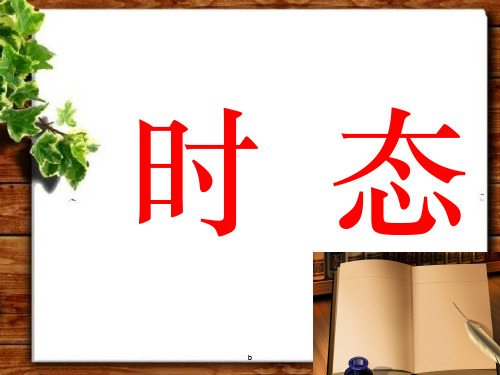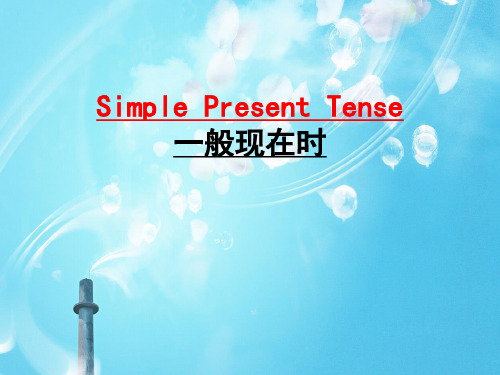(完整版)一般现在时PPT课件.ppt
合集下载
一般现在时(课件)人教PEP版英语六年级下册

情况 一般动词 以x, sh, ch, s, tch结尾 以辅音字母加y结尾 以元音字母加y结尾 以o结尾 特殊情况
构成 加s 加es 去y,加ies 加s 加es
例词 comes, spells, waits, talks, sees, dances, trains
watches, washes, wishes, finishes study/studies, hurry/hurries, try/tries
③一般疑问句Do/Does+主语+实义动词原形+其他? Do you speak Chinese?
肯定回答 Yes,主语+do
Yes, we do.
否定回答 No,主语+don’t
No, we don’t.
④特殊疑问句 特殊疑问词+do/does+主语?
What does he do?
例句:①We have classes from Monday to Friday. 我们从周一到周五上课。 ②--- Do you often write to your friends? 你经常给你的朋友们写信吗?--- Yes, I do. /No, I don’t. 是的,我经常写。/不,我不经常写。
plays, says, stays, enjoys, buys does, goes
are/is, have/has
实战练习1--根据要求写句子。
1.Helen goes to school early. (改成否定句) ______________________________________________________ 2. That is a bus. (改成复数句子) ______________________________________________________ 3. I can read for a long time.(改成一般疑问句) ______________________________________________________ 4. Your mother is a doctor. (改成一般疑问句) ______________________________________________________ 5.My eraser is pink. (改成复数句子) ______________________________________________________
英语八大时态PPT课件(详细版)

b
15
He is a lazy man . He ____the dirty jeans every day.(2014 )
A. always wears B. always wearing C. always to wear D. is always wearing
You will know the truth after you ___him.(2013) A. see B. will see C. are seeing D.to see
b
16
三、一般过去时
1、构成 一般过去时用动词的过
去式表示。除系动词be的过去式 有人称和数的变化外,其他动词 的过去式无人称和数的变化。
b
17
2、用法
※表示过去已经发生的动作,现在 已经结束,常与相应的过去时间状 语连用。 Tom fell ill last night , and he had to stay at home.
【翻译】
我今年20岁,住在北京。 I am twenty years old this year , and I live in Beijing.
火车将在一个小时后(in an hour)出发(set off)。 The train sets off in an hour.
她每天都走路上学。 She walks to school every day. 或:She goes to school on foot every day.
If it doesn’t rain tomorrow,we’ll
go shopping.
பைடு நூலகம்
b
6
常与一般现在时连用的时间状语有:
often 经常
一般现在时ppt课件完整版

不可数名词作主语时,谓语动词用单数 形式。
可数名词单数作主语时,谓语动词也用 单数形式。
例如:Water is essential for life.(水 对生命至关重要。)/ A book is on the table.(一本书在桌子上。)
例外情况总结
当主语为并列主语时,谓语动词的数要与靠近它的主语保持一致。
练习3答案
reads。解析:主语 She 是第三人称单数 ,且时间状语为 on weekends,表示经 常性动作,所以谓语动词要用单数形式 reads。
THANKS
时间状语分类及举例
表示经常性或习惯性的动作
always, usually, often, sometimes
表示现在的状态或特征
now, at present, these days
表示普遍真理或客观事实
in general, as a rule
频率副词分类及举例
01
高频副词
always, constantly, continually
注意区分完全否定和部分否定。完全 否定表示全部否定,而部分否定表示 部分否定。例如,“None of the students passed the exam.”(没 有一个学生通过了考试)是完全否定 ;“Not all of the students passed the exam.”(并非所有学生都通过 了考试)是部分否定。
does he work?等。
动词短语和情态动词的变化规则
03
动词短语中的动词和情态动词后接动词原形,如I can swim,
they often go out等。
02 肯定句结构与用法
主语+动词原形+其他成分
(完整版)一般现在时课件SimplePresentTense

10
Complete the sentences. Use the proper verb forms in brackets
1. Jordan __p_la_y_s__(play) basketball. He d__o_es_n_’_t_p_l_a_y_(not play) football.
哪些词是第三人称单数(三单)?
5、不定代词someone, nobody,everyone, everything, something作主语可以看作是 第三人称单数。
Everyone is here. 大家到齐了。
6、当数字或字母作主语时,看作第三人称单数。
“6” is a lucky number. “6”是个吉利数字。 “A” is a letter . A是个字母。
No,it isn’t.
be + 主语 + 其它部分?
肯定回答:Yes,主语+be
否定回答:No,主语+be+not
注意:在回答时,主语要用相应的代词代替
2、Can you speak English ?
情态动词 主语 动词原形 其他部分
Yes,I can.
No,I can’t.
情态动词 + 主语 + 动词原形 + 其它部分?
8
否定句的构成
These boys like playing football. These boys don’t(do not)like playing football.
The girl reads English every day. The girl doesn’t(does not)read English every day.
Complete the sentences. Use the proper verb forms in brackets
1. Jordan __p_la_y_s__(play) basketball. He d__o_es_n_’_t_p_l_a_y_(not play) football.
哪些词是第三人称单数(三单)?
5、不定代词someone, nobody,everyone, everything, something作主语可以看作是 第三人称单数。
Everyone is here. 大家到齐了。
6、当数字或字母作主语时,看作第三人称单数。
“6” is a lucky number. “6”是个吉利数字。 “A” is a letter . A是个字母。
No,it isn’t.
be + 主语 + 其它部分?
肯定回答:Yes,主语+be
否定回答:No,主语+be+not
注意:在回答时,主语要用相应的代词代替
2、Can you speak English ?
情态动词 主语 动词原形 其他部分
Yes,I can.
No,I can’t.
情态动词 + 主语 + 动词原形 + 其它部分?
8
否定句的构成
These boys like playing football. These boys don’t(do not)like playing football.
The girl reads English every day. The girl doesn’t(does not)read English every day.
初中一般现在时ppt

句型转换 1.My brother works in Shenzhen. ______ ______ your brother ________? 2.One of my classmates comes from Australia. ______ ______ one of your classmates______ _______? 3.He does his homework every day.(否定句) He _______ _______ his homework every day. 4.David wants to see me. _______ ______ David _______ to see? 5.She teaches English in No.8 Middle School. ________ ______ she _______ English? 6.My parents live in Chongqing now. ________ live in Chongqing now? 7.They look very young.(一般疑问句) ______ they _______ very young?
2.实义动词的一般现在时句式:
肯定句:
主语(I/We/You/They)+v.+其他
e.g. We study in a high school.
They have a pet.
否定句:
主语(I/We/You/They)+do+ not+v.+其他
They don’t have a pet.
is
to drink
looks
doesn’t do
doesn’t like
初中英语一般现在时动词用法课件ppt(36张)

2 一般性的事实或者真理。
The sun rise in the east. 太阳从东方升起 The earth is round. 地球是圆的。
-What do you do?
-What do you do?
-I ...
- I ...
-What do I do?
-What do you do?
I go to school every day.
I do my homework every day.
I go to bed at 9:00.
二、实义动词
Know-point 2
1、实义动词的概念 实义动词,即行为动词,表示动作的动词。
I play basketball.
She wears a beautiful skirt.
三、动词的第三人称单数形式变化规则
1、一般由动词原形加-s walk-walks write-writes like-likes
写出下列词汇的第三人称单数形式:
talk say
______ ______
look __, sh结尾的动词加-es wash- washes watch-watches finish- finishes
—Do you eat every morning? —Yes, I do./No, I don't.
—Does she have a little brother? —Yes, she does./No, she doesn't.
翻译下列句子并作肯定否定回答
1 你们喜欢打篮球吗? 2 他在9点前睡觉吗? 3 Mary 是美国人吗?
It is a dog.
They are scientists.
初中英语语法之 一般现在时 PPT课件 图文

2.用括号内动词的适当形式填空。 1. We often_______(play) in the playground. 2. He _______(get) up at six o’clock. 3.____you______(brush) your teeth every morning. 4. What______ (do) he usually____ (do) after school? 5.Danny_______(study)English, Chinese, Maths, Science and Art at school.
How old _a_r_eyou? Where a_r_e_ they ?
小结:be 动词的一般现在时的句式: 肯定句:主语+be+表语(n., adj.等)
否定句:主语+be+ not+表语.
一般疑问句:Be+主语+表语?
特殊疑问句:疑问词+be+主语?
2.实义动词的一般现在时句式: 肯定句: 主语(非三单)+v.原形+其他. 1) I _s_ta_y___ (stay) at home on Saturdays. 2) They h__a_v_e_ (have) sports every day. 3) My parents _g_iv_e_(give) me ten yuan
What _d_o_e_s_ she_w_a_n_t_ (want)? What time _d_o_you_h_a_v_e_ (have) lunch? What time d_o_e_s_she_h_a_v_e(have) lunch?
What _d_o__ you _d_o_(do)? What _d_o_e_s__ she _d_o__(do)? How __d_o_ you_sp__el_l (spell) it? How _d_o_e_s_ he s_p_e_l_l _(spell) it?
一般现在时现在进行时和一般过去时和一般将来时态ppt(共26张PPT)

• e.g. I was born in 1980. • I was not born in 1980.
• Were you born in 1980?
第二种 含有行为动词的
• 肯定结构
• 主语+行为动词(过去式)+其它 否定结构
主语+didn’t+行为动词(原形)+其
它 一般疑问句结构
Did+主语+行为动词(原形)+其它?
看来将要发生的事或存在的状态。
• 肯定句:主语+ will+动词原形------
• There will be a computer on every desk in the future.
• 未来每个桌子上都将有一台电脑。 • It will rain tomorrow. 明天将要下雨。 • We will go to school on foot.
• 我们将步行去上学。
• 特殊疑问句:疑问词+一般疑问句?
• 一般将来时II: is/am /are going to + 动词原形的
用法。
• 1、主要用来表示打算或计划要做某事, 主语是人。
如: • She is going to learn Japanese next year. • There is going to be a football match tonight. • Dad and I are going to see Beijing opera this
未来每个桌子上都将有一台电脑。 今天下午我和爸爸打算去看京剧。
swim
chat
第二种 含有行为动词的
I am going to go swimming tomorrow(明天).
2.主语为非第三人称单数的情况
• Were you born in 1980?
第二种 含有行为动词的
• 肯定结构
• 主语+行为动词(过去式)+其它 否定结构
主语+didn’t+行为动词(原形)+其
它 一般疑问句结构
Did+主语+行为动词(原形)+其它?
看来将要发生的事或存在的状态。
• 肯定句:主语+ will+动词原形------
• There will be a computer on every desk in the future.
• 未来每个桌子上都将有一台电脑。 • It will rain tomorrow. 明天将要下雨。 • We will go to school on foot.
• 我们将步行去上学。
• 特殊疑问句:疑问词+一般疑问句?
• 一般将来时II: is/am /are going to + 动词原形的
用法。
• 1、主要用来表示打算或计划要做某事, 主语是人。
如: • She is going to learn Japanese next year. • There is going to be a football match tonight. • Dad and I are going to see Beijing opera this
未来每个桌子上都将有一台电脑。 今天下午我和爸爸打算去看京剧。
swim
chat
第二种 含有行为动词的
I am going to go swimming tomorrow(明天).
2.主语为非第三人称单数的情况
初中英语一般现在时学习课件(共25张ppt)

Watch TV
I often ( ) TV at 8:00.
my father and I go swimming every sunday
My father and I ( ) swimming every Sunday
we play football every Wednesday
We ( ) football every Wednesday.
•9、要学生做的事,教职员躬亲共做;要学生学的知识,教职员躬亲共学;要学生守的规则,教职员躬亲共守。2021/8/312021/8/31Tuesday, August 31, 2021 •10、阅读一切好书如同和过去最杰出的人谈话。2021/8/312021/8/312021/8/318/31/2021 7:50:25 AM •11、只有让学生不把全部时间都用在学习上,而留下许多自由支配的时间,他才能顺利地学习……(这)是教育过程的逻辑。2021/8/312021/8/312021/8/31Aug-2131-Aug-21 •12、要记住,你不仅是教课的教师,也是学生的教育者,生活的导师和道德的引路人。2021/8/312021/8/312021/8/31Tuesday, August 31, 2021
• You have to believe in yourself. That's the secret of success. 人必须相信自己,这是成功的秘诀。
•
Exercise
• 8.I ( ) a boy. • 9.You ( ) a girl. • 10.He ( ) a teacher.
Homework(家庭作业)
1.将所学内容重新看一遍。 2.当一回小老师,给爸爸妈妈讲解什 么是一般现在时。Fra bibliotek是辅音字母
一般现在时(示范课)ppt课件精选全文

精选课件
27
• 3. Daniel enjoys playing computer games.
• (改为一般疑问句并做肯定回答)
Does Daniel enjoy playing computer games?
Yes, he does.
精选课件
28
补充:some、any
• 一般说来,some 用于肯定句中,any 用于 否定句和疑问句中 。
Change the following sentences after the models.
Model 1: I like fish. (meat) I don’t like meat.
Model 2. He likes reading. (writing) He doesn’t like writing.
改疑问句或否定句时,原句里的some要改成any
There are some books on the desk. (改为否定句)
→There aren’t any books on the desk.
→Are there any books on the desk?
精选课件
29
Why not buy some apples? 为什么不买些苹果呢?
精选课件
26
句型转换
• 1. Mr. Green comes from Shanghai. • (改为一般疑问句)
Does Mr. Green come from Shanghai?
• 2. Millie lives in a flat in Beijing. • (改为否定句)
Millie doesn’t live in a flat in Beijing.
- 1、下载文档前请自行甄别文档内容的完整性,平台不提供额外的编辑、内容补充、找答案等附加服务。
- 2、"仅部分预览"的文档,不可在线预览部分如存在完整性等问题,可反馈申请退款(可完整预览的文档不适用该条件!)。
- 3、如文档侵犯您的权益,请联系客服反馈,我们会尽快为您处理(人工客服工作时间:9:00-18:30)。
7. Tom can not walk fast because he _c_a_r_r_ie_s(carry) a heavy box.
用动词的适当形式填空
1.She ____(go) to school at eight o’clock.
2. He usually _____ up at 17:00.(get )
直接加s
Fly-flies;ห้องสมุดไป่ตู้stay-stays
• 第三节 • 特殊疑问句
• I clean the window at home on Saturdays.
• 1、对主语提问:
• Who cleans the window at home on Saturdays?
• 2、对宾语提问:
Has David got a goal?
7. We have four lessons.(否定句) We don’t have four lessons.
8. Nancy doesn’t run fast (肯定句)
Nancy runs fast. 9. My dog runs fast. 否定句:My dog doesn’t run fast.
5. Danny_s_t_u_d_ie_s__(study) English, Chinese, Maths, Science and Art at school.
6. Mike sometimes g_o__e_s_(go) to the park with his sister.
7. At eight at night, she w__a_tc_hes (watch) TV with his parents. 8. _D_o_e_s_ Mike r_e_a_d_(read) English every day?
9. How many lessons _d_o_e_s_ your classmate _h_a_v_e__(have) on Monday?
10. What time _d_o_e_s__ his mother _d_o___(do) the housework?
改句子 1. Do you often play football after school? (肯定回答)
flowers every day 否定句: 一般疑问句: 划线提问:
14. Tom does his homework at home. 否定句: 一般疑问句: 划线提问:
用一般现在时或现在进行时填空。 1. Miss Guo ______ (teach) us Chinese this term. She ______ (be) a very good teacher. She often ______ (talk) with us after class. 2. She often ______(read) English in the evening.
3. She ____ (live) in Beijing.
4.______go and help her.
(A)Let's me
(B)Let's us
(C)Let's
(D)Let's to
5.Do they have a new car? Yes,_____.
(A)they are
(B)they have
• When do you clean the window at home?
总结
• 1、对划线部分提问,划线部分不能再 出现。 2、特殊疑问句的结构:
• 特殊疑问词+be动词(或助动词、或情 态动词)+其他部分+?
1. We often _p_la_y__ (play) in the playground.
• What do you clean at home on Saturdays?
• 3、对谓宾提问:
• What do you do at home on Saturdays?
• 4、对地点状语提问:
• Where do you clean the window on Saturdays?
• 5、对时间状语提问:
4n.eSahreNSdehoweeslYinvoe’rtskl.iivne(ains改ma为aslm一l ta般ollw疑tno问wn句) Near New York.
5. I watch TV every day. (改为一 般疑问句)
Do you watch TV every day? 6. David has got a goal. (改为一 般疑问句)
一般疑问句:
Does your dog run fast?
10. Mike has two letters for him. D一o般es疑M问ik句e h:ave two letters for him? M否ik定e 句do:esn’t have two letters for him. 11. I usually play football on Friday . I u否s定ua句lly: don’t play football on Friday. 一般疑问句:
Do you usually play football on Friday?
W划h线at提d问o you usually do on Friday.
12. Su Yang usually washes
some clothes on Saturday. 否定句: 一般疑问句: 划线提问:
13. Mingming usually waters the
2. He _g_e_t_s__ (get) up at six o’clock. 3. _D_o___ you _b_r_u_s_h (brush) your teeth every morning?
4. What _d_o_e_s__he usually_d_o____ (do) after school?
(C)they don't
(D)they do
6.He often _________ supper at 6:00 in the evening.
A. have C. is having
B. has D. is eating
7.We _____________ any Chinese classes on Friday.
一般现在时PPT课件
当主语是第三人称 单数时,谓语动词的
变化规则
1、一般情况下 直接加S
comes; jumps; kicks
2、以”o,x,s,ch,sh” 结尾的加es
goes ; brushes; watches; does;
3、以辅音字母+y结
尾,变y为i加es; 以元音字母+y结尾,
A. are having B. aren’t having C. don’t have D. are have
8. Where _________ he _________ from?
A. is, come B. do, come C. does, come D. is , from
1. teaches, is, talks,reads
4. Where _d_o_e__s_ their father_w_o__rk__ (work)? He _w_o_r_k_s_ (work) on a farm.
5. What time _d_o_e_s__ the shop _c_lo__s_e_ (close)? Itc_l_o_s_e_s(close) at nine o'clock in the evening. 6. He _g_o_s_e__(go) to school by bus every day.
Yes, I do. 2. I have many books. (改为否定 句)
I don’t have many books.
3. Gao Shan’s sister likes playing tabGleaoteSnhnaisn’(s 改sis为te否r d定o句es)n’t like
playing table tennis.
